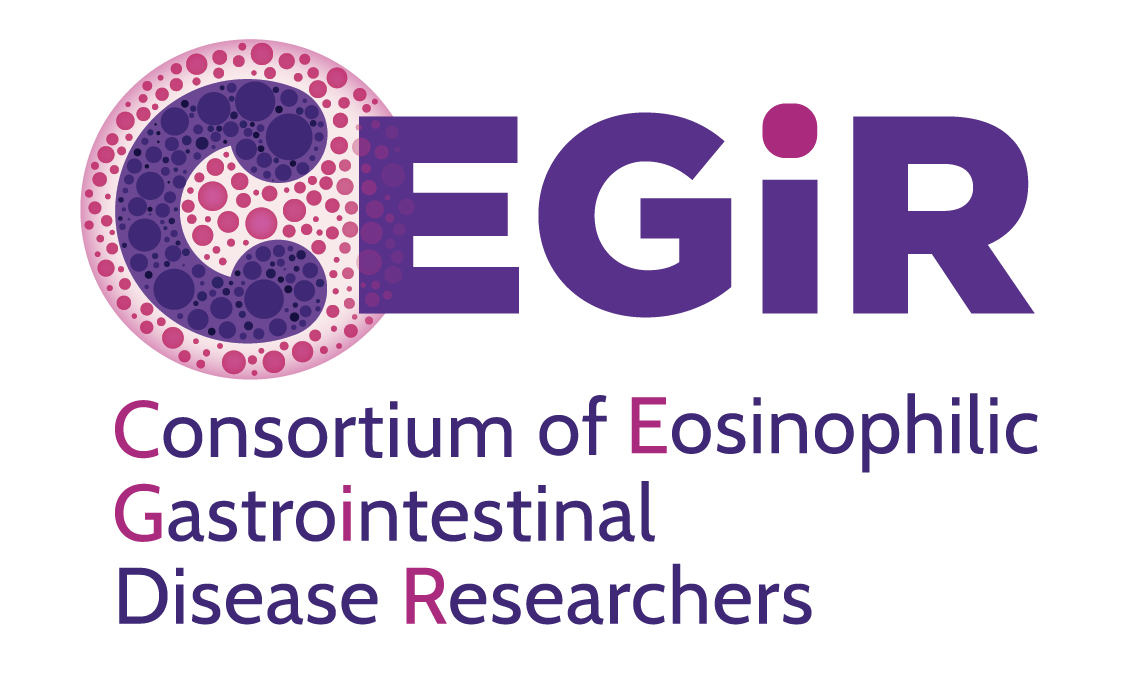7801: A Prospective, Multicenter Study to Compare and Validate Endoscopic, Histologic, Molecular, and Patient-Reported Outcomes in Pediatric and Adult Patients with Eosinophilic Esophagitis (EoE), Gastritis (EoG), Colitis (EoC) and Enteritis (EoN)
OMEGA
Outcome Measures for Eosinophilic Gastrointestinal Diseases across Ages
A Prospective, Multicenter Study to Compare and Validate Endoscopic, Histologic, Molecular, and Patient-Reported Outcomes in Pediatric and Adult Patients with Eosinophilic Esophagitis (EoE), Gastritis (EoG), Enteritis (EoN) and Colitis (EoC)
This research study is funded by the National Institute of Allergy and Infectious Disease (NIAID), National Institute of Diabetes and Digestive and Kidney Diseases (NIDDK), Division of Rare Diseases Research Innovation (DRDI), National Center for Advancing Translational Sciences (NCATS).
What is the goal of OMEGA?
CEGIR is conducting this study because they want to learn more about Eosinophilic Gastrointestinal Diseases (EGIDs). As part of that goal, one area of study will compare how well a patient feels – their symptoms – with what the tissue samples look like under a microscope. The study aims to answer a series of questions, including the following:
- What if the tissue looks good, but you are still experiencing symptoms?
- What if the symptoms have subsided, but the eosinophil counts haven’t changed?
This study is designed to give researchers and clinicians a better idea of the correlation of symptoms to the tissue, help them find clues about the disease in the tissue samples, and assess how this information could be used in the future to help guide diagnosis and treatment plans.
OMEGA is a multicenter, longitudinal study of children and adults with EoE, EoG, EoN and EoC.
What is a longitudinal study?
A longitudinal study collects information from the same group of patients over a long period of time. When studying rare diseases, researchers usually have to conduct small trials with fewer patients, and that means they have less information to study. For this trial, which will last for the duration of funding, multiple centers across the US will enroll patients and share the information among many researchers. This means there will be more patients, more information, and more researchers to study EGIDs.
Will participating in the OMEGA trial interfere with your current treatment plan?
No. The OMEGA study is an “observational” research study. It will not interfere with, change, or otherwise intervene with your treatment plan.
If you participate in OMEGA, what is involved?
If you consent to participate in this study, researchers will follow the progress of your treatment plan. As part of the standard monitoring process for EGIDs, patients have periodic endoscopies and/or colonoscopies with biopsies. If you participate in OMEGA and are scheduled to have an endoscopy/colonoscopy, researchers may request your permission to take additional tissue and/or blood/saliva samples for the study. Also, as a study participant, you will periodically be asked to complete questionnaires. These questionnaires may take 30-45 minutes to complete.
Please contact a study site for more details of what is involved with participation.
Should you participate in OMEGA?
You and your family are in the best position to make the decision about whether or not you wish to participate. Currently, only the clinic sites listed below are enrolling for the OMEGA trial, so travel to/from one of these locations will be necessary for treatment and study participation. Travel and other costs related to the usual care of your eosinophilic disorder will be the responsibility of you and/or your insurer. There is no charge to you or your health insurance company for any costs that are directly related to this observational study. You will receive no payment for participating in OMEGA.
If you are currently under the care of an EGID medical provider/team NOT affiliated with one of the participating clinics, you will need to change health care providers in order to participate in OMEGA (i.e., all OMEGA patients must be receiving treatment for their eosinophilic disease from a doctor at one of the participating clinics).
This study presents a significant opportunity for the EGID patient community to take an active role in helping CEGIR gain a better understanding of EoE, EoG, EoN and EoC. Every effort will be made to enroll as many patients as possible, but there are no guarantees that everyone who wants to participate will be able to enroll. If you have questions about the trial and/or specifics about what is involved, please contact one of the study coordinators identified below.
Who is eligible to participate in OMEGA?
- Children and adults between the age 3 and 65.
- You (or your child) must have been diagnosed with one of the following*:
- Eosinophilic Esophagitis (EoE)
- Eosinophilic Gastritis (EoG)
- Eosinophilic Enteritis (EoN)**
- Eosinophilic Colitis (EoC)
- You (or your child) must have had symptoms related to your EGID (past or present). If you have few/no symptoms today as the result of current treatment for your EGID, you are still eligible to participate in OMEGA.
- You (or your child) must have had mucosal eosinophilia (eosinophils in your digestive tract). If you are being treated for an EGID and are presenting with low numbers of eosinophils, you are still eligible to participate in OMEGA.
* Patients with a diagnosis of Eosinophilic Enteritis (EoN) or Eosinophilic Duodenitis (EoD) can contact a study coordinator for additional eligibility details.
You may not be eligible to participate in OMEGA…
- If you have a history of intestinal surgery other than G tube placement.
- If you are enrolled in a blinded investigational study at the time you want to join this study.
- If you have other identifiable causes for eosinophilia, such as infections, gastrointestinal (GI) cancer, and/or another GI inflammatory disease.
Who should you contact if you wish to participate and/or have questions?
In order to participate in a study, you must personally contact the study coordinator of any of the participating institutions by phone or by e-mail.

